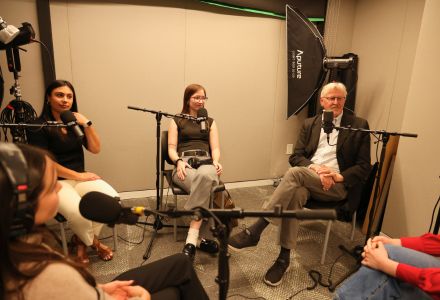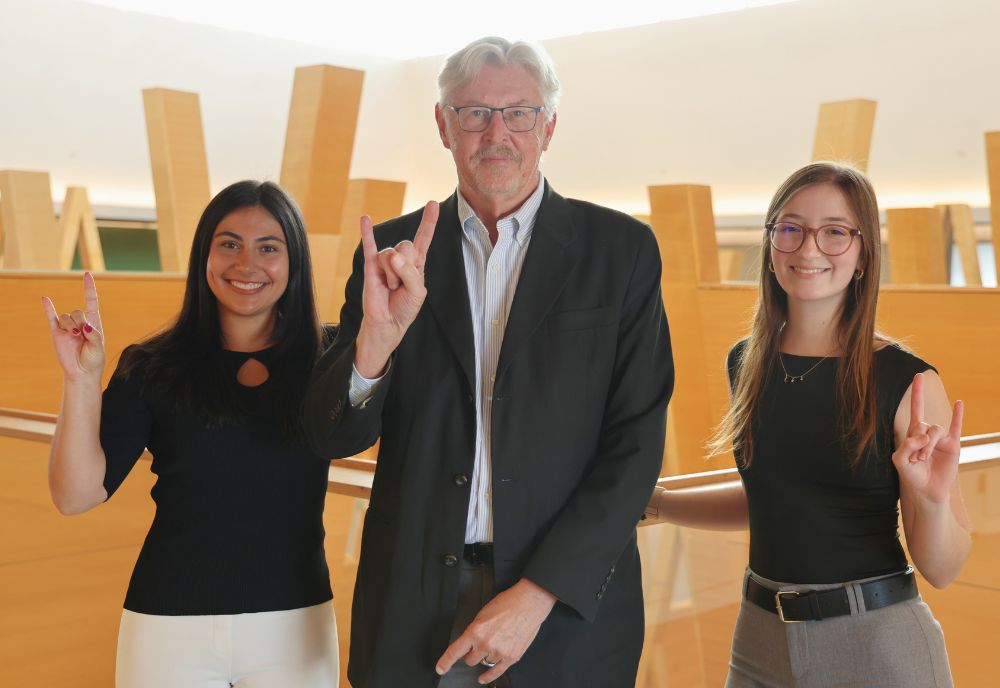A University of South Florida (USF) Judy Genshaft Honors College capstone course is linking Honors students with executives around the world. USF Global Education Faculty Award recipient Dr. Gregory Smogard’s Global Consulting course enables students to quickly learn and apply consulting best practices while navigating the challenges of interdisciplinary teamwork, language barriers, and cultural differences. Smogard’s personal experience in the business world gives him a unique edge when it comes to curriculum design.
“I've been an entrepreneur and a consultant,” said Smogard, “So what I want to do is bring that into the classroom and put together a hands-on, real-world, high-impact experience for the students.”
The three-credit, hybrid Honors capstone hosted on USF's Sarasota-Manatee campus,
requires students to undergo an interview process before enrollment. Smogard assesses
their previous work experience and skills to assemble well-balanced teams and match
them with suitable companies and business challenges.
“My goal with the interviews is to find out more about the students’ backgrounds,
work experience, and skills sets,” said Smogard. “This helps me decide what teams
to put them on and what kinds of projects we would want to work on.”
Each team consists of four to six students. Among them, fourth-year marketing major
Alison Frate and third-year applied and computational mathematics major Abigail Brake
collaborated on a project for a company in the Philippines focused on protecting rural
areas from natural disasters.
Diverse Team Dynamics
Frate served as the team's project manager and main communicator, scheduling meetings and maintaining correspondence with company representatives. Coordinating across a 12-hour time difference proved difficult, requiring flexibility and late-night meetings.
“There was a 12-hour time difference, so as the communications lead, I really had to work hard to schedule our meetings,” Frate said. “Some days, we were meeting at 8 p.m. because it was 8 a.m. in the Philippines.”
Brake, leveraging her mathematical background, focused on data analysis, an area that significantly enhanced their project’s impact.
“Data analytics ended up being something that the company was really interested in,” Brake said. “It drove the presentation just a little bit further to where they can see the actual numbers and projections of impact.”
Sustainable Solutions
Through extensive research and collaboration, Frate and Brake’s team developed recommendations to enhance disaster resilience in the Philippines. Sustainability emerged as a key priority for the company, and the students tailored their solutions accordingly.
Frate investigated mangrove rehabilitation and natural seawall barriers, studying how mangroves endure natural disasters. Brake researched methods for reinforcing vulnerable slopes that had become unstable due to deforestation and natural factors. She drew inspiration from Nepal and India, where bamboo crib structures have successfully restored vegetation in barren areas.
“I think what unified us is that we both focused on green infrastructure,” Brake said. “We were thinking that whatever we propose, it needs to improve the environment over time and not cause more negative impacts.”
Real-World Impact

Students in the Global Consulting course deliver a PowerPoint presentation and an oral report to the management team of their assigned company, as well as submit a written report with actionable recommendations. Frate and Brake found the immediate impact of their work particularly rewarding.
“I really liked the fact that we are handing them deliverables that they would potentially use to impact and help the Philippines,” Frate said. “Asking the company about their resources helped make the impact measurable and reminded me that this project has a real effect.”
Brake also enjoyed the measurable impact of the coursework and found that their autonomy as student consultants helped them to grow quickly and learn through the process.
“We became so invested in this project because we really were there from the initial idea generation,” Brake said. “The autonomy of the project is definitely scary, but Dr. Smogard and the team directed us so that our work aligned with the company’s goals.”
Building Professional Skills in a Global Landscape
For Frate and Brake, the interdisciplinary and international experience of the capstone course provided valuable professional development in addition to research and communication proficiencies.
“The project opened my mind not just internationally, but also to exploring new places and interacting with individuals from different backgrounds — even my team was multidisciplinary,” Brake said. “I think putting yourself in these types of situations is when you learn the most.”
Frate encouraged other students to enroll in the course, emphasizing its benefits to all majors.
“This course was a really great opportunity to grow, so I encourage other students to put themselves out there into a field they’re not familiar with,” Frate said. “That’s where you learn and grow.”
